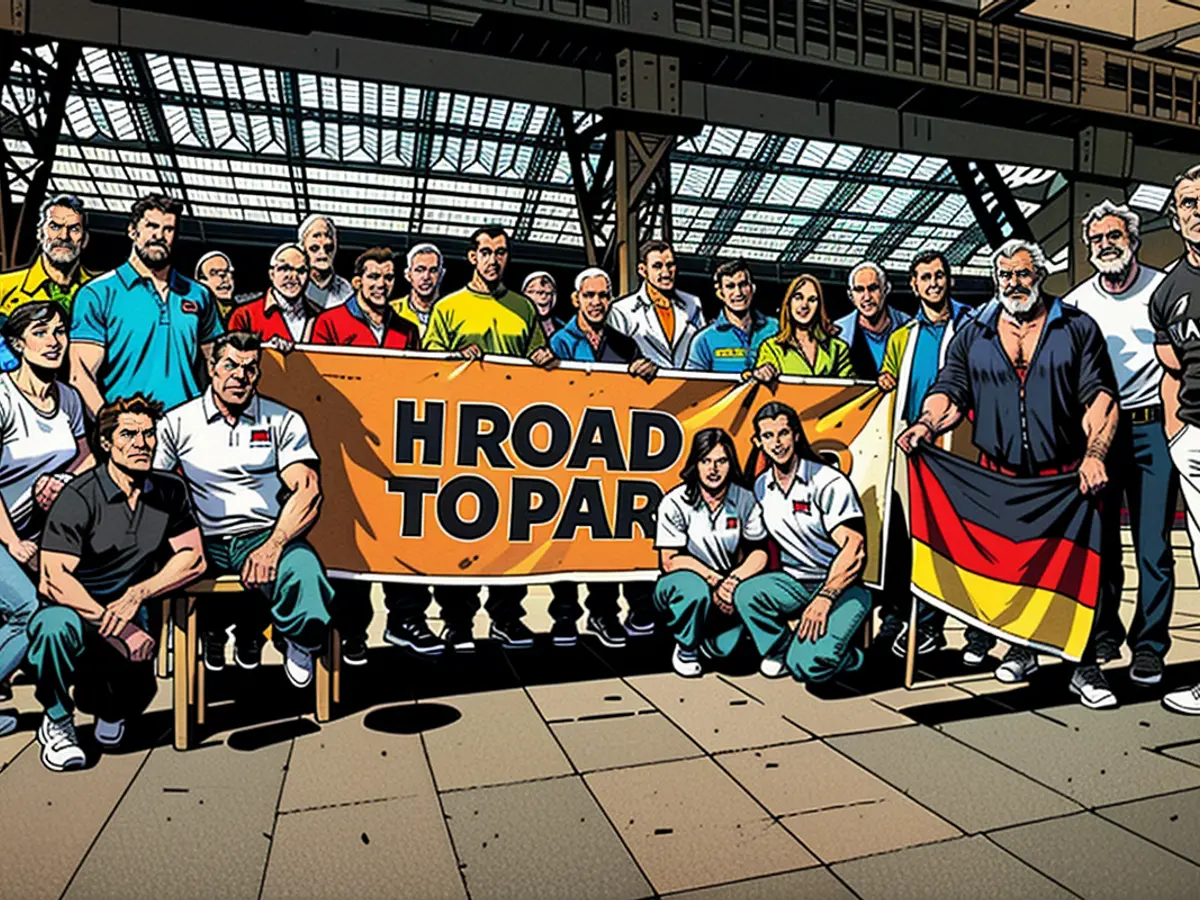German Paralympic expectations are being obscured by Russian preparations
Starting Wednesday, Paris will once again be ablaze with athletic fervor as the Paralympics kick off in a grand ceremony. Around 143 German competitors will be present, all vying for medals. The newbies are buzzing with excitement, but there's also a touch of irritation.
Following the Paralympics in Tokyo and Beijing, where the Corona pandemic cast a long shadow, the stands will be bustling once more. The opening ceremony at Place de la Concorde is expected to draw 35,000 spectators, along with an additional 15,000 visitors nearby and packed crowds at the Stade de France or the Bercy Arena.
Wheelchair basketball player Lukas Gloßner will be among those battling for points with the German men. The 24-year-old is traveling with lofty expectations and is looking forward to the overwhelming support. "My family will be there, loads of friends have confirmed - it's going to be an epic event," he says. "The fanfare, the opening ceremony - everything I've ever envisioned, now to experience it for real, feels pretty cool."
Gloßner is part of a total of 143 German Paralympic competitors who aim for medals in 18 out of the 22 sports. Five guides will join them. Sadly, there will be no German participants in goalball, blind football, or the sports of taekwondo and weightlifting. "Our team is larger than it was at the Paralympics in Tokyo three years ago, which puts a halt to the decline in team size. And this despite the tougher qualification process for team sports due to smaller participant numbers," Chef de Mission Karl Quade shares.
The ultimate goal is to rank among the top ten nations, as per Beucher. In Tokyo, Germany won a total of 43 medals and stood at 12th place. "We hope our athletes can deliver their best, honed through years of training, in a fair competition against international rivals," Beucher says.
Max Gelhaar, a triathlete heading to Paris in top form, harbors similar hopes. If the 26-year-old from Leipzig can build upon his previous successes, he becomes a promising medal contender. He's already bagged three bronze and one silver at World Championships. "How well the year has gone so far, I have to admit honestly: I want a medal. If it should then be gold, of course, I wouldn't object," he says.
In contrast, Paralympic athlete Martina Willing is participating for the tenth time – the most among the German delegation. She first experienced the Paralympics in 1992 and has since claimed three gold medals and even participated in winter sports once in 1994. Longtime dressage rider Heidemarie Dresing, at 69 years old, is the oldest athlete on the German team, while 14-year-old swimmer Johanna Döhler is the youngest.
"We have a nice blend of extremely experienced athletes as well as young gunners who've qualified for their first Paralympic Games," Quade explains. In total, 57 newbies will represent Germany.
Swimming sensation Elena Semechin, with a wealth of experience, won gold three years ago in Tokyo. Just weeks after her incredible victory, she was diagnosed with a brain tumor. Semechin fought back and is now eyeballing a title defense, having overcome chemotherapy.
"These hurdles have only made me stronger and shaped my character. I must emphasize that cancer didn't seize control of my life," insists the Berliner. "I've reveled in many splendid athletic triumphs, but my greatest victory is who I am today and what I've made of my life."
In Paris, Semechin will rely on her inner circle for support. "For the first time, friends, family, and partners are coming to cheer me on, which is exceptionally thrilling for me," says Semechin. "When eager fans roar and the venue comes alive with energy, it's electrifying and gives me a boost."
Controversy also surrounds Russian athletes. "They don't deserve a place here," Beucher asserts firmly. "If the Olympics and Paralympics are meant to spread messages of peace, then there's no room for an aggressor, who invades another country, causing death and destruction."
Russian and Belarusian athletes are once more prohibited from joining the opening ceremony, and their national anthem won't be played if they emerge victorious. The ban on participating under the Russian flag stemmed from the military actions in Ukraine. Despite the German side's proposition for a full exclusion, a sufficient majority wasn't reached during the International Paralympic Committee's meeting in Bahrain. Beucher expressed his frustration, stating, "That's water under the bridge," and referring to the situation as a "supposed compromise that's not a compromise, but a smokescreen." Initially, teams were excluded, and individual athletes underwent evaluation by an appointed external commission beforehand. It was forbidden to publicly support the Ukraine war or have any ties to their country's military. Beucher criticized the situation, stating, "Anyone familiar with Russian and Belarusian sports understands that it's impossible without state involvement. They're essentially state-backed amateurs and officials. I don't grasp how a state official can oppose the war in Ukraine. We'll thoroughly investigate this and speak up about it." The participation, according to Beucher, does not 'brighten' the image of the Paralympics.
After the controversial exclusion of Russian and Belarusian athletes from the opening ceremony, the focus shifts back to the German competitors. Lukas Gloßner, a wheelchair basketball player, is one of the 143 Germans aiming for medals in 18 out of the 22 sports during the Paralympics in Paris.








